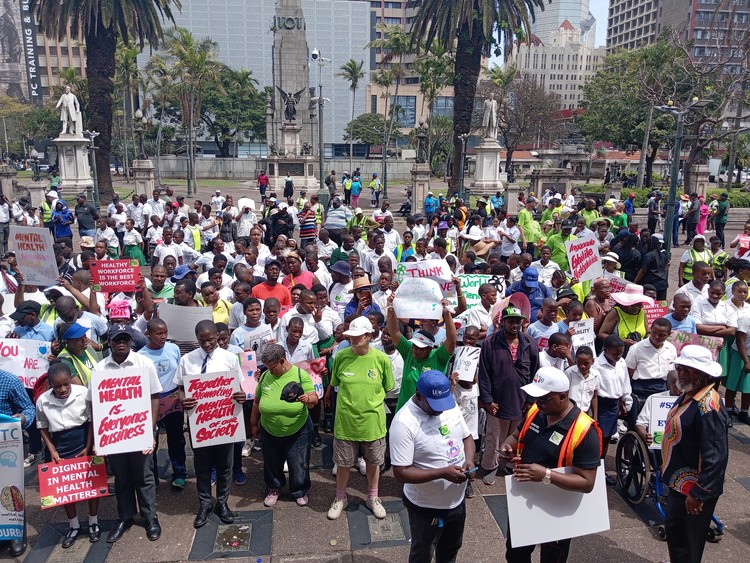Durban picketers demand accessible mental health services
About 100 people protested outside the city hall to mark World Mental Health Day on Thursday.
Durban and Coastal Mental Health led a march to the city hall on Thursday to mark World Mental Health Day. The group want the government to increase funding and resources to organisations offering services and support for people with mental health conditions and their families. Photo: Tsoanelo Sefoloko
About 100 people, including learners from special needs schools, marched to the city hall in Durban’s city centre to raise awareness and mark World Mental Health Day on Thursday.
The protest was led by Durban and Coastal Mental Health. The picketers want an end to the stigma around mental health conditions. They also wants the government to increase funding and resources to organisations offering services and support for people with mental health conditions and their families.
Lungisani Mthiyane, representing the organisation, said they were disappointed the health department didn’t take up their invitation to join the march nor send a representative to accept their memorandum.
“We are going to follow up as to why they decided to ignore our invitation. Today is a day that the department was supposed to show support,” said Mthiyane.
NEHAWU provincial deputy secretary Ntokozo Nxumalo said union members joined the march to show solidarity.
“We want to emphasise that mental health is everybody’s responsibility,” said Nxumalo. He noted the concerning rise in workers needing to be treated for depression.
According to the protesters’ memo only 5% of the national health budget has been allocated to mental health, while a third of the population are affected by mental health conditions. It also noted the lack of services and the struggle of many people in the region to access any services or crisis interventions due to barriers such as affordability and other socio-economic issues.
Among their recommendations was for the eThekwini municipality to offer affordable or free services to communities. They believe that council categorising organisations offering mental health services as private businesses is a fundamental flaw in the City’s economic policy.
The municipality’s Mlulama Ngcobo accepted the memo and promised that it would reach the mayor who was in a special council meeting.
The provincial health department’s Nathi Olifant told GroundUp that he would look into why there was no response to the group’s invitation.
Support independent journalism
Donate using Payfast

Don't miss out on the latest news
We respect your privacy, and promise we won't spam you.
Next: Court bid to decriminalise sex work
Previous: The Limpopo government mismanaged their money. But these workers are not giving up
© 2024 GroundUp. This article is licensed under a Creative Commons Attribution-NoDerivatives 4.0 International License.
You may republish this article, so long as you credit the authors and GroundUp, and do not change the text. Please include a link back to the original article.
We put an invisible pixel in the article so that we can count traffic to republishers. All analytics tools are solely on our servers. We do not give our logs to any third party. Logs are deleted after two weeks. We do not use any IP address identifying information except to count regional traffic. We are solely interested in counting hits, not tracking users. If you republish, please do not delete the invisible pixel.

